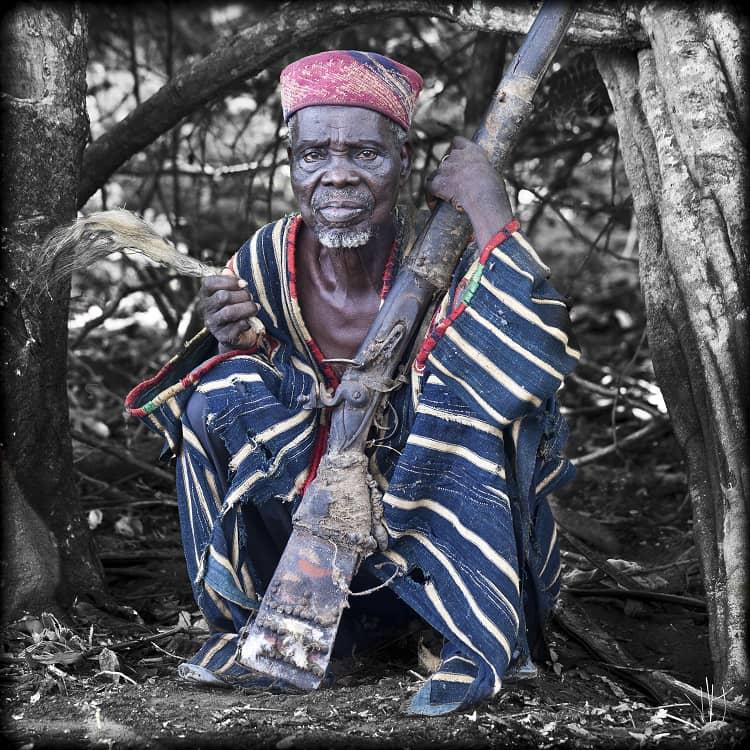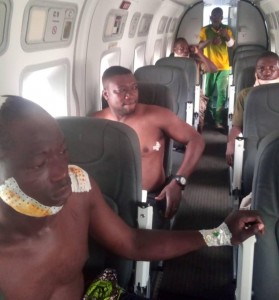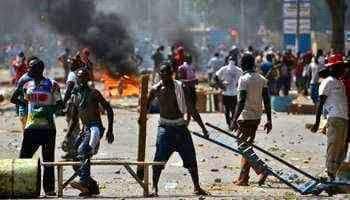Post-election violence rages on in Benin
BY LOU SIFA
(With reporting by Thierry Lobbo)
The unprecedented violence that marred the bogus parliamentary election held in Benin on 28 April was believed to be over, but it erupted again at the beginning of last week and raged on throughout the weekend causing a higher number of casualties than earlier.
Heavy shootouts between the security forces and out-of-control, outraged protesters turned Tchaourou, the birthplace of former president Yayi Boni, and the nearby town of Save into a war zone for the whole of last week. The mayhem brought traffic on the interstate road between Benin and Niger to a halt, as the crowds deflated the tires of dozens of trucks loaded with goods bound both south or north.
The violence was triggered by the arrest of a young man suspected of leading the previous uprising in the area during the 28 April bogus election that was boycotted by more an estimated 90% of the voters. The protesters also demanded that former president Yayi, who has been under house arrest for over a month in his own residence in Cotonou, be freed. Since 1 May, security forces camped near the ill former president’s residence stop anyone—reportedly including his lawyers and his doctors—from seeing him. (Besides Yayi’s denunciation of the 28 April election from which the entire opposition was excluded, Yayi and his former financier Patrice Talon has some personal scores to settle).

The outraged protesters that took to the streets of Tchaourou and Save received a big support from the local traditional hunters and, reportedly, the latter’s peers from Nigeria. These hunters operate with voodoo power which makes them invisible to the enemy who falls under the impact of their bullets without knowing where the bullets are coming from. This may sound laughable to anyone who is not familiar with the local culture, but it is definitely a tangible reality. The authorities, who are much aware of this reality, allegedly brought their own man supposedly endowed with the power to withstand the hunters’ power, but to no avail. He allegedly succumbed to the hunters’ bullets.
There is so far no definite account of the casualties. The official number of dead stands at 5, and dozens of wounded. But our correspondent, who spoke to eye witnesses who have been following the uprising since its beginning last week, reports that the number of dead is much higher.

In a short address broadcast on national on television on Friday, the minister in charge of security, Sacca Lafia, gave the measure of the uprising by confirming that the out-of-control protesters had “seriously wounded dozens of security forces.” According to The African Magazine’s local correspondent, some of the wounded security forces received first aid in the local health units, and others had to be flown to Cotonou.
According to both official and private accounts, the number of wounded soldiers is much higher than that of the outraged crowds. The minister said on Friday that “the situation was under control” after additional security forces had been dispatched to the trouble areas on Thursday. Not true, according to several news organizations such as Africa 24 television and TV5 Afrique channel.
The protesters, and the locals who strongly support them, proved to be a force to reckon with, forcing the authorities to engage in a negotiation to bring back peace, or else. This led to a tense peace being restored over the weekend, and traffic began to flow again on the Benin-Niger interstate route.
The young protesters, backed by the much-feared hunters, required that security forces barring entrance to former President Yayi’s residence be removed, and that the local youths who were arrested both during the earlier and the current uprisings be released. Otherwise, they can strike again.
A testament to the protesters’ weight on the scale: a majority of the detainees have been released while negotiations continue.
Sitting African presidents seldom—if ever—criticize their sitting peers, so only two former regional heads of state, Olusegun Obasanjo of Nigeria, and Ghana’s John Kufuor, in a statement issued last week called for “the immediate release” of Yayi Boni. The two leaders state that
“there is a general feeling of violation of the individual and collective liberties which has invariably culminated in the restrictions currently imposed on former President Boni Yayi and some other opposition leaders.”
The two former presidents called it as they saw it:
“Contrary to the general principle, which stipulates that elections should be inclusive of all political stakeholders to ensure fairness, justice and equity, the prevailing situation in Benin appears not to be in line with the aforementioned.”
Then they called on the two regional organizations that are ECOWAS and the African Union to act:
“The crisis in Benin calls for urgent action by ECOWAS and African Union to avert the escalation of the festering political unrest. We are of the view that all stakeholders should be carried along in the electoral process.”
The former presidents’ call to free former president Yayi and halt the free fall of Benin’s democracy may sound like a wishful thinking in light of the fact that several African organizations, including ECOWAS, have formally recognized the new parliament born out of the bogus 28 April election.



